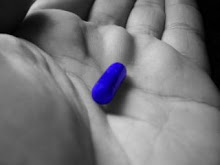I'll use the example that Corporate gave us.
Mrs. Shelly Smith comes in with a script for Aciphex that she's been getting for 9 months.
Her brand co-pay is $30 and her generic co-pay is $10.
We are to suppose to stop her at drop-off and tell her that she can save money by switching to pantoprazole, lansoprazole, or omeprazole.
Now let's suppose she says no.
We're supposed to thank her for her consideration...fine.
But what if she says yes? Well then the shit hits the fan. First we have to set some shit up in the new computer system (which we don't have yet). Then we have to inform the patient that in order to fill their prescription, we have to contact the doctor for approval. Assuming the doctor approves this ridiculous decision, we get a verbal script over the phone and fill that new script. In a perfect world, this would take 20-30 minutes at the least. And that's if we get a hold of the MD himself/herself on the first ring when we call!
How about a dose of reality:
(I'll use drug names so as not to confuse)
Mrs. Smith says yes to us substituting omeprazole for her Aciphex (in order to save $20/month). Now our pharmacist has to stop what she is doing and call the doctor's office. Nine times out of ten, the MD is not available. They have to call us back, which means we have to tell the patient that they need to wait. Now what if you came in to a pharmacy expecting to wait 15 minutes for your prescription and now you learn that you are at the mercy of your doctor who, let's face it, doesn't care that you're at the pharmacy waiting for him to call. You've already left his office and he's made his money. He'll call the pharmacy when he gets a chance. Meanwhile, 10 minutes pass...20 minutes...30 minutes. Our pharmacist calls again to let the office know that you're still here waiting. The doctor calls back 10 minutes later and says that filling the prescription with omeprazole is OK. now you have to wait another 10-15 minutes while we type it up and fill it. All in all, you waited at least 45 minutes to get a generic drug that saves you $20. We're just getting to the good stuff.
Because we got authorization from your MD to fill a generic, your Aciphex Rx is now void in our system. I hope you like your new generic. But here you come 1 week later complaining about how omeprazole doesn't work at all and you want to return it and you want your Aciphex filled. Now we get the privilege of explaining to you that when you decided to go with omeprazole, your decision voided your Aciphex Rx. In order to fill the Aciphex, we have to call the doctor again and let him know that you don't like the omeprazole and you want Aciphex. The doctor then says to just fill the Aciphex then. Now we get to look stupid again and explain to your doctor that when he authorized a generic drug, it voided the Aciphex script. The doctor gives us a verbal Rx for Aciphex and now hates us (again this is after you wait another 30-45 minutes while we wait to hear back from the doctor). Now we have to tell you that once a prescription leaves the pharmacy we cannot take it back. You throw a fit because you're retarded and you don't have the patience of a normal human. You pay your normal $30 for your Aciphex and leave. Next month you transfer your script to some other pharmacy so you don't have to deal with this stupid shit again.
This is the dumbest idea anyone has ever come up with. I'm not even a pharmacist and I feel bad for my pharmacists. They're going to have to make 10 times as many phone calls. They're already stressed for time. They don't need this on top of what they're doing. We don't need this on top of what we're doing either. We are busy ringing people up and running to the damn drive-thru. We have to count prescriptions and meet budget everyday as well. We're already a busy pharmacy. It feels like Corporate is out of touch with the people who are actually having to do this retarded shit.


